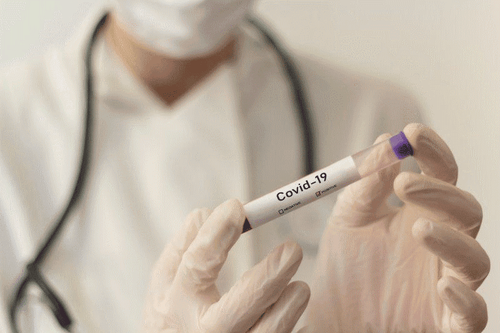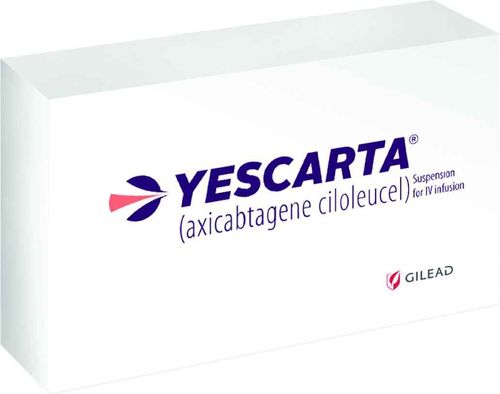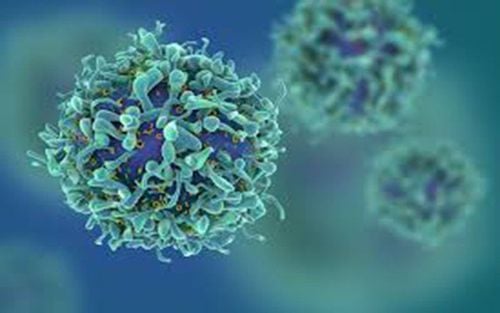This is an automatically translated article.
Breyanzi is an FDA-approved prescription drug for the treatment of adults with relapsed or refractory large B-cell lymphoma who have been treated with at least 2 prior therapies.
1. What is the brand name Breyanzi drug?
Breyanzi (Lisocabtagene Maraleucel) is a cancer treatment with autologous T-cell immunotherapy that has been genetically modified with CD19. T cells, part of the immune system, are removed from the patient's body intravenously by a process called leukocyte electrophoresis. These cells will be taken to the lab and added a chimeric antigen receptor (CAR) to the patient's T cells. These T cells are then infused back into the patient's body. CAR gives T cells the ability to identify, attack, and destroy cancer cells.
Breyanzi is indicated for the treatment of relapsed or refractory large B-cell lymphoma, after at least 2 previous systemic therapies, including:
Diffuse large B-cell lymphoma; High-grade B-cell lymphoma; Primary mediastinal large B-cell lymphoma; Grade 3B follicular lymphoma.
2. How to infuse Lisocabtagene Maraleucel - Breyanzi
Lisocabtagene maraleucel is given through an intravenous line. Breyanzi dose will be individualized for the patient. Patients can receive chemotherapy in the days before Breyanzi infusion to prepare the body for treatment with Lisocabtagene Maraleucel.
Before the Lisocabtagene Maraleucel infusion, the patient will be given a pre-medication, including acetaminophen (Tylenol) and an H1 antihistamine such as diphenhydramine (Benadryl). Patients will need to be closely monitored after Breyanzi infusion and may require inpatient treatment for a certain amount of time, usually several weeks after Breyanzi is administered.
3. Notes when using Breyanzi
Note that viruses in the patient's body can be reactivated after treatment with this drug, so it is standard that patients should be tested for hepatitis B, hepatitis C and HIV before using Lisocabtagene Maraleucel. In addition, patients should consult their doctor before receiving any vaccine. Lisocabtagene Maraleucel is only available through a limited program under the Risk Assessment and Mitigation Strategy (REMS) - BREYANZI REMS to ensure that the facility is qualified to administer the medication and that the drugs are readily available. necessary support in the event of adverse events. Patients should not drive or operate heavy machinery for at least 8 weeks after taking Breyanzi. Breyanzi can cause side effects that can affect your ability to do these tasks. Patients should not donate blood, tissues, cells or organs after receiving an infusion of Breyanzi.
4. Possible side effects when taking Breyanzi
Patients can apply a number of different measures to control the side effects of the drug Breyanzi. These measures will be guided and selected by the doctor for each specific patient.
The following are some of the most common or important side effects of Breyanzi:
Cytokine release syndrome: After infusion of Lisocabtagene Maraleucel, a large number of white blood cells become activated and release cytokines. cause massive inflammation, sometimes triggering a cytokine storm. Signs include: high fever, lower-than-normal blood pressure, difficulty breathing, severe nausea and vomiting, severe diarrhea, chills, shaking, severe muscle and joint pain, bleeding. This serious side effect can occur for up to 4 weeks after the Breyanzi infusion. Neurotoxicity: Commonly seen within the first 8 weeks after Breyanzi infusion include headache, convulsions, personality changes, anxiety, disorientation, confusion, agitation, speech difficulties, dizziness and run. Infection - low white blood cell count: during Breyanzi treatment patients are at higher risk of infection. Patients should notify your doctor or nurse immediately if they develop a fever higher than 38°C accompanied by a sore throat or cold, difficulty breathing, cough, burning when urinating... after taking Breyanzi. Fatigue does not decrease even with rest: adjust your schedule to control fatigue, plan time to rest, and exercise moderately to help combat fatigue. Decreased platelet count: tell your doctor if you notice bruising or unusual bleeding (bleeding from the nose or teeth, bloody urine, etc.). Platelet transfusion is necessary if the patient's platelet count is too low while taking Breyanzi; Muscle or joint pain, headache, abdominal pain: Your doctor may recommend medications and other measures to help relieve the pain. Heart problems: Low blood pressure, fast heartbeat. Tell your doctor if you feel light-headed, dizzy, or your skin becomes rough. Be careful during daily activities such as showering, driving or operating any kind of machinery. Nausea and vomiting: Medications to help control nausea and vomiting can be added along with dietary changes, avoiding things that can worsen vomiting symptoms such as foods that are too solid. or more greasy/fat, spice or acid (lemon, tomato, orange). Common multiple immunodeficiency diseases: Breyanzi can reduce the patient's immunoglobulin level, if necessary, immunoglobulin can be used to supplement. Patients are at high risk for infection, so recommendations should be followed to reduce the risk of infection. Do not get any vaccine without consulting your doctor. Decreased appetite or changes in appetite: Patients may experience a metallic taste or tasteless foods, even if they enjoyed foods they enjoyed prior to Breyanzi treatment. These symptoms may persist for several months or longer after treatment ends; Diarrhea, constipation: Oncologists may refer patients to medications to relieve these symptoms due to Breyanzi. Anemia, reduced red blood cells manifests as: fatigue or lack of strength, shortness of breath, chest pain... In some cases, the red blood cell count is too low due to Breyanzi, which may require a blood transfusion. Peripheral edema, swelling of the extremities due to fluid retention: swelling of the hands, arms, legs, ankles and feet. Important but less common Breyanzi side effects
Allergic reactions; Secondary cancer: related to chemotherapy is a blood cancer (leukemia, lymphoma) that can occur years after treatment, often associated with repeated treatments or high doses of drugs ; Breyanzi affects reproduction.
5. Advise patients while taking Breyanzi
Recommendations to reduce the risk of infection:
Patients should wash their hands frequently; Limit going to crowded places or contact with people showing signs of infection (people showing signs of cold, fever, cough or living with someone with these symptoms); Do not dispose of pet waste while being treated with Breyanzi ; Keep skin wounds or scratches clean at all times; Bathing, personal hygiene, regular dental care; Do not remove corners or trim ingrown fingernails/toenails; Talk to your oncologist before having a dental procedure while taking Breyanzi ; Consult your doctor before receiving any vaccines while taking Breyanzi. Besides, patients should also avoid some activities that can cause bleeding during treatment with Breyanzi as follows:
Using razors; Playing contact sports that have the potential to cause injury or bleeding; Concomitant use of Breyanzi with Aspirin or non-steroidal anti-inflammatory drugs (NSAIDs); Use dental floss, toothpicks; Do not brush your teeth with a toothbrush that is too stiff. Nutrition is an important part of health care during cancer treatment, but side effects of treatment can make it difficult to eat, patients should apply some of the following notes:
Try to eat 5 or 6 small or light meals throughout the day, instead of 3 large meals; Use additional nutritional supplements if needed; Avoid any food that the patient thinks has an unpleasant odor or taste. If there is a problem with red meat, eat chicken, turkey, eggs, dairy products and fish that do not have a strong odor. The flavor of meat or fish can be enhanced by seasoning with juices, sweet and sour sauces.... Use spices such as basil, coriander or rosemary for extra flavor. In addition, bacon, ham, and onions can help add flavor to vegetable dishes. Some measures to reduce diarrhea:
Limit dietary fiber supplements; Avoid fresh fruits or vegetables, wholegrain breads, nuts and cereals; Soluble fiber can help the body absorb fluids and help relieve diarrhea caused by Breyanzi effectively, they are abundant in apple sauce, ripe bananas, canned fruit, oranges, boiled potatoes, white rice, potatoes fried... Breyanzi users should pay attention to drink enough water, limit alcohol or caffeine to prevent dehydration due to diarrhea. Patients can prevent or reduce constipation by:
Adding dietary fiber (fruits and vegetables); Drink 8-10 glasses of non-alcoholic liquids per day; Maintain sports activities; Use a stool softener 1 or 2 times a day; If the patient does not have a bowel movement for 2-3 days, he or she should contact the doctor for recommendations on methods to relieve constipation. Exposure of the fetus to Breyanzi can lead to birth defects, so patients should not become pregnant or father a child during cancer treatment with Breyanzi. Applying effective birth control or birth control is essential, especially during treatment and for at least 1 week after Breyanzi therapy ends.
Follow Vinmec International General Hospital website to get more health, nutrition and beauty information to protect the health of yourself and your loved ones in your family.
Please dial HOTLINE for more information or register for an appointment HERE. Download MyVinmec app to make appointments faster and to manage your bookings easily.
Reference source: oncolink.org













